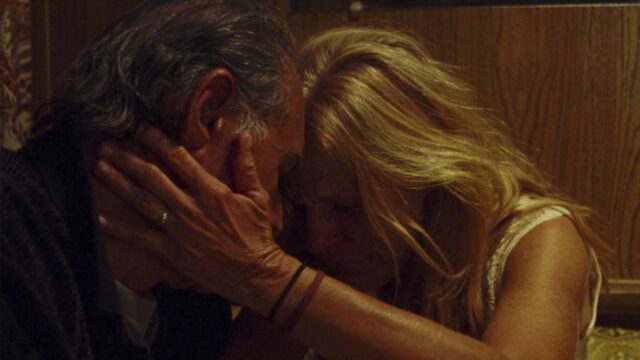A Love Song: See If I Can’t Find, by David Bax

It seems like we’ve had a lot of movies lately about remote American life, observing the toil and the process of people building lives out of sight of civilization’s bustle. Some of these films give a warm approval to such choices (Montana Story, Bitterbrush). Some of them depict the life as a kind of last resort for the broke and broken (Nomadland, Land). Max Walker-Silverman‘s A Love Song certainly belongs to the general pack, with its rural Colorado setting, but it’s less insistent on drawing conclusions about these vast, underpopulated parts of the country. Faye (Dale Dickey) and Lito (Wes Studi), two former sweethearts, have chosen this campsite to reunite after decades apart and that’s that. Like so much of A Love Song, the treatment of the place is touching and beautiful in its face-value simplicity.
Another thing we’ve already seen a lot in cinema and that we all ought to get used to seeing a lot more is references to the ongoing COVID-19 pandemic. In a move that’s probably true to the characters and the region, nothing about the virus and its fallout is ever explicitly mentioned in A Love Song. But Walker-Silverman makes sure we know the film takes place in September of 2020, a time when lockdown and restriction fatigue was driving more and more people to retreat to the countryside. Maybe that’s not what Faye and Lito are doing, exactly, but the timestamp creates a connection to that feeling and those memories nonetheless.
Memories and feelings are all that Faye and Lito have in their attempt to rekindle passions on the other side of each’s now concluded marriages. Their history is made more potent and tactile by virtue of our own history with Dickey and Studi. As with John Carroll Lynch‘s similarly rustic and eccentric Harry Dean Stanton vehicle Lucky, casting character actors who have been on the periphery of our moviegoing lives for more than a quarter century proves a savvy decision. Faye and Lito ponder guiding their lives in a new direction at the same time as we witness reliable supporting players step into lead roles.
Of course, within the reality of the film, Faye and Lito haven’t been seeing each other on a semi-regular basis all this time. And when they reunite, the usual adages of picking up right where one left off or riding a bicycle don’t apply. It’s not just the two of them anymore. The years in between are a constant presence, invisible but perhaps unbridgeable.
Walker-Silverman makes his feature debut here as both writer and director. In both modes, there is evidence of first-timer self-consciousness. This is especially true of the dialogue, which bears a Wes Anderson-style staccato cadence. It’s not original, really, but there’s a hypnotic rhythm to it as it gradually becomes just as much a part of the experienced landscape as the regular whine of the nearby oil derrick. And it certainly doesn’t hurt when the words are spoken by such finely aged voices.






























